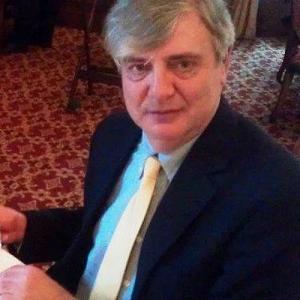LEGENDS OF
LIGHT MUSIC
Philip Lane

The composer and
record producer is profiled by
EDMUND WHITEHOUSE
Philip Lane was
born in 1950 at Cheltenham, the
English Regency spa town at the
foot of the Cotswolds Hills made
famous through patronage by
George III. It supports many
annual festivals including
National Hunt racing, literature,
cricket and international music
but was quite parochial until the
latter stages of the 20th
Century. The family owned a
harmonium on which the small
budding musician showed quite an
aptitude, after which an upright
piano was acquired on which he
was able to indulge his fancies
for almost every type of music.
At six he embarked
on formal lessons and when his
teacher discovered he could play
by ear, remarked "Don’t
worry, he will grow out of
it". He then spent the new
few years trying to persuade his
pupil that his talents lay in the
library service!
At the age of 11
he moved to Pate’s Grammar
School for boys whose former
pupils include Gustav Holst and
Brian Jones of the Rolling
Stones. Here he learnt to play
the organ and earned more from a
half hour funeral (for which his
enlightened headmaster allowed
him time off) than his friends
could make in a whole week
delivering newspapers.
He then took to
accompanying a local choral
society and spending weekends and
holidays working for W.H. Smith
at the time when the Beatles and
Bob Dylan were at their height.
Selling records possibly gave him
ideas and he began to compose,
among his works being carols,
piano pieces and a string
quartet, plus an orchestral
Sinfonietta since withdrawn. The
symphony orchestra was to prove
his favourite means of
expression.
In 1969 he went to
Birmingham University to read
Music. His interview with
Professor Ivor Keys took the form
of little more than playing
through his piano duet suite
Badinages, later to become his
first commercially recorded work.
He was told he would
"probably be accepted"
and after he went up, two of his
tutors turned out to be John
Joubert and Peter Dickinson.
There was little time for
composition lessons, however, and
he was excused orchestration when
it was discovered that his
orchestral works were already
being played down the road at the
BBC Pebble Mill studios by the
BBC Midland Light Orchestra!
Despite later encouragement from
Bernard Hermann, Philip considers
himself virtually self-taught in
both disciplines.
Whilst at
University he developed a deep
interest in Lord Berners
(1883-1950) who, in addition to
being an accomplished composer
was also a painter, novelist and
general eccentric. Philip’s
thesis on the composer, coupled
with several radio talks, led to
him being appointed a trustee of
the Berners Estate and overseeing
the completion of all
Berners’ music on to CD.
From 1975-1998
Philip taught at Cheltenham
Ladies’ College during which
time he received many
commissions, especially for upper
voices. In his spare time he
worked freelance for London
publishers and quite by chance,
in 1993, was invited to look
after the estate of Richard
Addinsell (1904-77). He wrote a
radio documentary on the subject
and was then asked to embark on
what became something of a
passion for film music. The Marco
Polo CD of Addinsell’s music
needed to include the famous film
score for Goodbye Mr. Chips, the
brilliant 1939 film which starred
Robert Donat. Unfortunately, most
of the score was lost so Philip
sat down and listened to the film
over and over again, eventually
successfully recreating the music
as it first appeared.
This led naturally
to him being commissioned to do
the same thing for other famous
films, such asThe Thirty Nine
Steps and The Lady Vanishes. He
is now an acknowledged expert on
the restoration of
"lost" film music and
has been interviewed several
times about the subject on BBC
Radios 3 and 4. It would not be
unfair to say the nation owes him
a great debt because so many film
scores were simply destroyed
during times when nobody ever
considered there would be any
future interest or use for them.
Among the film composers
"rescued" in this
manner are Arnold, Auric, Alwyn,
Bliss and Victor Young.
Philip Lane’s
commercial successes include
library music, compositions for
BBC plays (including The Merchant
of Venice and Sir Thomas More),
plus the TV animation of the
immortal Captain Pugwash. Live
music has included a choral
commission to mark the centenary
of the death of Lewis Carroll,
one from the winners of the
Sainsbury Choir of the Year, and
a ballet Hansel and Gretel for
the National Youth Ballet.
Conductor Gavin
Sutherland, with whom Philip has
worked on several outstanding
CDs, commented on "a
perfectionist with the quiet aura
of a schoolmaster surveying his
class, who has played a very
large part in the preservation of
much of the British Light Music
canon that was presumed
lost."
It was Cheltenham
Ladies’ College’s great
loss when Philip decided to
devote himself full-time to
composing and producing CDs but
it was a great gain for the music
world in general. It is hard to
underestimate how much he
achieved in such a short time and
we should all be profoundly
grateful that he took the bold
step of leaving a secure post in
a top public school to enhance,
recreate and restore tuneful
British music.
[from Journal Into
Melody March 2004]
|